 'Model husband' shatters image of love
'Model husband' shatters image of love
 Can animals smile? Or put on a happy face
Can animals smile? Or put on a happy face
 Geng Xuan crowned at 9th China Super Model Contest
Geng Xuan crowned at 9th China Super Model Contest
 Top 10 billionaires in the liquor industry
Top 10 billionaires in the liquor industry
 Backstage at China Fashion Week
Backstage at China Fashion Week
 Ballerinas anywhere but onstage
Ballerinas anywhere but onstage
 Top 10 safest airlines in the world
Top 10 safest airlines in the world
 Posters of 33rd HK Film Awards unveiled
Posters of 33rd HK Film Awards unveiled
 Top 10 most popular instant messaging apps in the world
Top 10 most popular instant messaging apps in the world
 Inspiring shadow images of Chinese army
Inspiring shadow images of Chinese army
Crowded subways and stuffy dust masks that characterize urban life in China are driving those who value quality of life over consumerism away from the cities and into mountain refugia.
Zhang Jianfeng, 37, is among them. Once a book editor with an enviable job in Xi'an, capital of northwest China's Shaanxi Province, Zhang quit his job six years ago to seek out hermits in the Zhongnan mountains, a fabled hideaway for recluses.
Zhang's interest in the reclusive life was fuelled by the book "Road to Heaven: Encounters with Chinese Hermits", written by American Red Pine.
"I was tired of wasting all my spare time and energy hobnobbing with various cliques. The book showed me that I could escape the urban hassles and seek inner peace in nature," he said.
Unlike most urbanites, Zhang's home was filled with Chinese curios - musical instruments, a straw rain cape, an iron kettle - harking back to a bygone era. The tranquility at home stood in stark contrast to the insanity beyond his walls.
A freelancer now, Zhang spends most of his time in a cottage hidden away in the Zhongnan mountains, and has gradually made the acquaintance of some "real" hermits.
These hermits tend to lead very simple lives in caves, shacks they built themselves or abandoned cottages. They get up at sunrise and sit in meditation. They drink tea, take a nap, read books, go for a stroll: Such is hermitship.
"Householder Buhuan", 65, is one of Zhang's new friends. The former factory worker gave himself a new name which means "never going back" in 2007 when he took up Buddhism.
Buhuan lives among the clouds in a rented farmhouse deep in the mountains. The owners went to the city during a campaign to return farmland to forest.
"They left to enjoy urban life, and I came to find peace," he said. Buhuan spends three or four days each month at his old home in the city. "My parents, wife and kids do not try to stop me because they know I will stick to my decision, no matter what."
But living in the mountains is not the romantic idyll many imagine. The recluses spend most of their energy just trying to feed themselves. Buhuan relies on a 1,600 yuan (about 260 U.S. dollars) pension to pay the rent, buy grain and pay for electricity in his hovel. "Compared with big cities, costs in the mountains are very low," he said.
Economic growth has given many people things they did not have before, but, according to Zhang, something has also been lost: inner peace. House prices, congestion, water and air pollution are the engines which drive the desire to forsake dystopian cities.
"They could be reintegrated into nature, find the lost 'something' and forget all their troubles," Zhang opines fancifully.
Zhang and associates have built more than 20 thatched houses with their own money in the mountains. Few, however, lead genuinely anchoritic lives. Mostly they are no more than disenchanted, disingenuous urbanites like himself, fed up with heavy workloads and stressful lives and with aspirations to "return" to "nature". Thousands now lead reclusive lives in Zhongnan, many of whom come on the spur of the moment and depart just as hastily; but a few choose to stay.
"They come from all walks of life: teachers, doctors, business folk and government officials. They leave everything behind and adopt new, rustic habits," he said.
As their numbers grow, so do Zhang's concerns. "You see the garbage scattered everywhere and dirty river? They disrupt the lives of real hermits who have to retreat even deeper into the mountains."
"Every year, urbanization takes millions of people from the countryside to the cities, but on those same clogged roads, you can now find people heading back to nature for spiritual peace," Yin Xiaojun of the Shaanxi Provincial Academy of Social Sciences said..
Those who seek a reclusive life can help others to understand their culture and inspire them to rethink their lifestyles, added Yin, but it does not mean they should abandon their social and familial responsibilities.
 Wonderful moment of China's airborne forces
Wonderful moment of China's airborne forces Bai Baihe shoots for fashion magazine
Bai Baihe shoots for fashion magazine Red terraced fields in Dongchuan of Yunnan
Red terraced fields in Dongchuan of Yunnan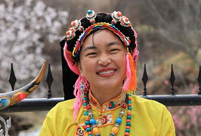 Jiaju Tibetan Village
Jiaju Tibetan Village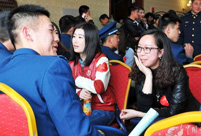 Spring dating
Spring dating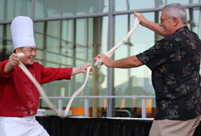 Confucius institute at UC Davis
Confucius institute at UC Davis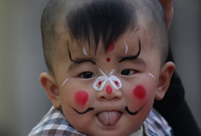 Little painted faces at temple fair
Little painted faces at temple fair Top 10 safest airlines in the world
Top 10 safest airlines in the world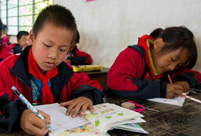 Foreign students at China-Myanmar border
Foreign students at China-Myanmar border The backstage of the Fashion Week
The backstage of the Fashion Week College students in Han costumes
College students in Han costumes Postgraduate works as waitress
Postgraduate works as waitress Life in a Lahu village in Yunnan
Life in a Lahu village in Yunnan An orphan’s wedding
An orphan’s wedding Hollywood documentary brings Diaoyu Islands truth to new audience
Hollywood documentary brings Diaoyu Islands truth to new audienceDay|Week|Month